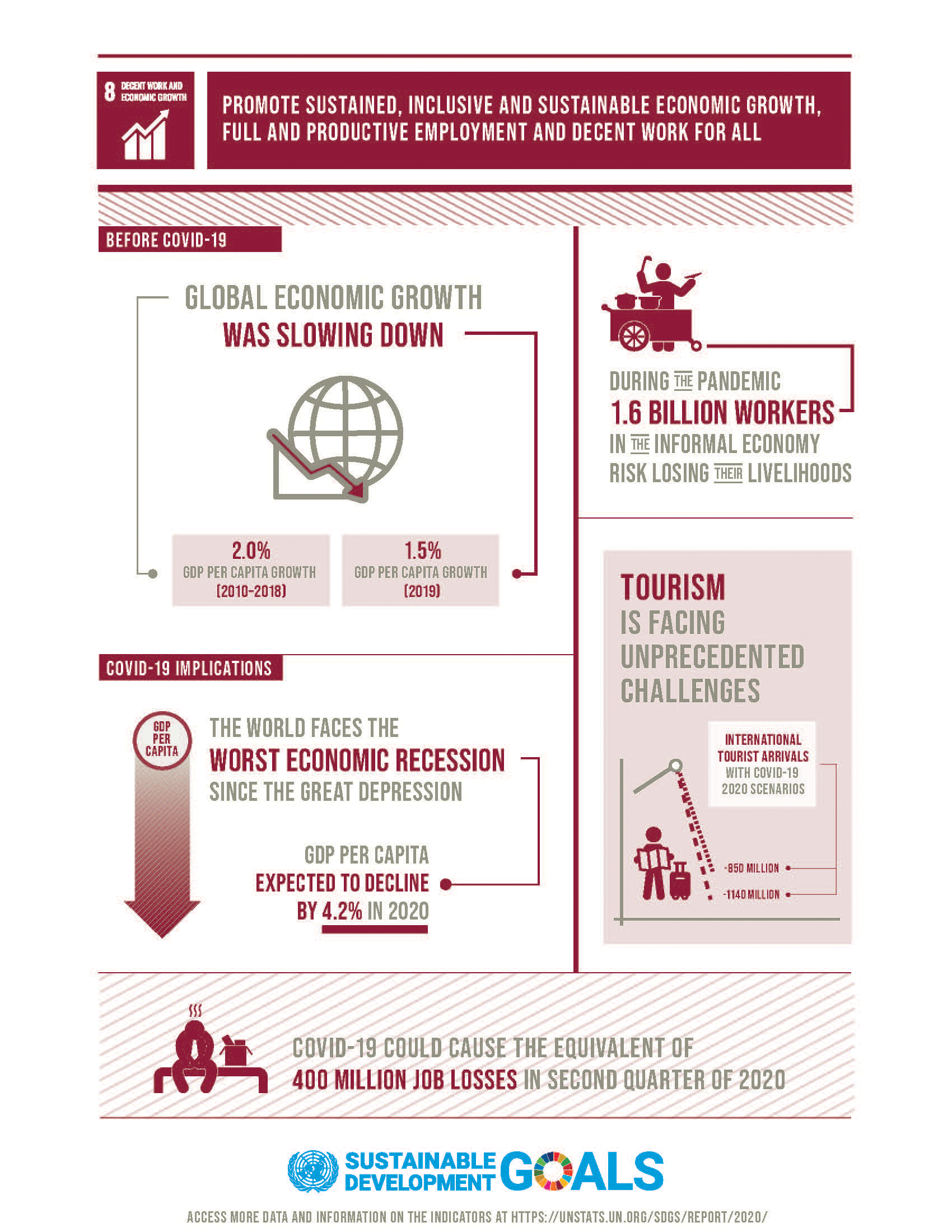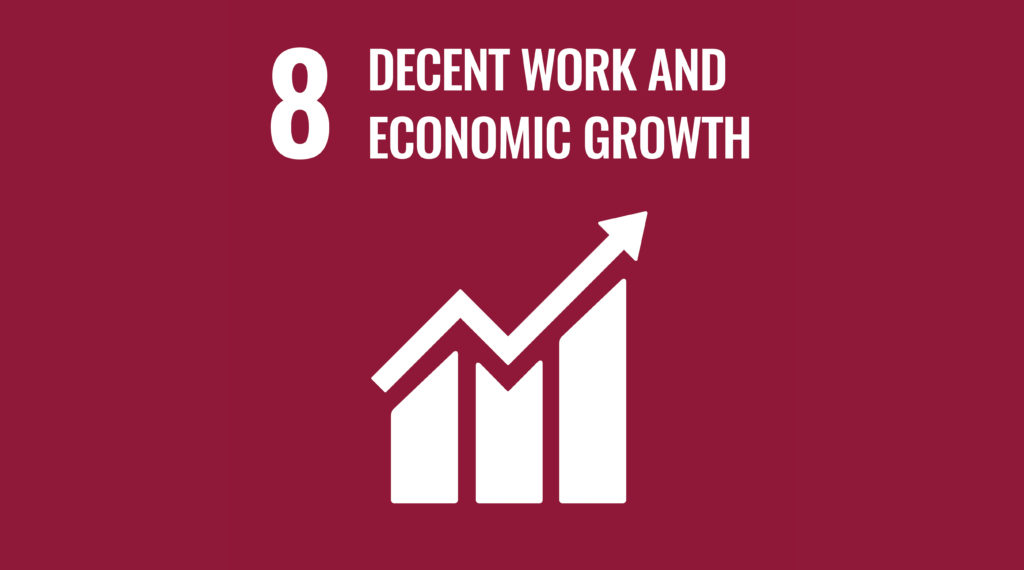Economic Growth
Sustained and inclusive economic growth can drive progress, create decent jobs for all and improve living standards.
COVID-19 has disrupted billions of lives and endangered the global economy. The International Monetary Fund (IMF) expects a global recession as bad as or worse than in 2009. As job losses escalate, the International Labor Organization estimates that nearly half of the global workforce is at risk of losing their livelihoods.
Even before the outbreak of COVID-19, one in five countries – home to billions of people living in poverty – were likely to see per capita incomes stagnate or decline in 2020. Now, the economic and financial shocks associated with COVID-19—such as disruptions to industrial production, falling commodity prices, financial market volatility, and rising insecurity—are derailing the already tepid economic growth and compounding heightened risks from other factors.
Sustainable Development Goals
The 2030 Agenda for Sustainable Development was adopted by all United Nations Member states in 2015, an agenda that provides a shared blueprint for peace and prosperity for people and the planet, now and into the future.
The 17 Sustainable Development Goals (SDGs) are an urgent call for action by all countries – developed and developing – in a global partnership. They recognize that ending poverty and other deprivations must go hand-in-hand with strategies that improve health and quality education, reduce inequality, and spur economic growth – all while tackling climate change and working to preserve our oceans and forests. Learn more about the UN SDG’s.

What’s the goal here?
To promote inclusive and sustainable economic growth, employment and decent work for all.
Why?
Sustained and inclusive economic growth can drive progress, create decent jobs for all and improve living standards.Even before the outbreak of COVID-19, one in five countries – home to billions of people living in poverty – were likely to see per capita incomes decline in 2020. Now, the economic and financial shocks associated with the pandemic—such as disruptions to industrial production, financial market volatility, and rising insecurity—are derailing the already tepid economic growth and compounding heightened risks from other factors.
What does “decent work” mean?
Decent work means opportunities for everyone to get work that is productive and delivers a fair income, security in the workplace and social protection for families, better prospects for personal development and social integration. A continued lack of decent work opportunities, insufficient investments and under-consumption lead to an erosion of the basic social contract underlying democratic societies: that all must share in progress.
How many people are unemployed?
The pandemic is expected to have a devastating impact on global unemployment. According to estimates from the International Labour Organization, global working hours could drop by 14 per cent in the second quarter of 2020. This is equivalent to approximately 400 million full-time workers doing a 48-hour work week. The eventual increase in global unemployment over 2020 will depend on how effectively policy measures preserve existing jobs and boost labour demand once the recovery phase begins.
More than one in six young people have stopped working since the onset of the COVID-19 pandemic while those who remain employed have seen their working hours cut by 23 per cent. Tourism is one of the economic sectors most affected by the COVID-19 pandemic due to the closure of borders, travel bans and lockdown measures. Depending on when travel restrictions are lifted and national borders reopen, international travel arrivals in 2020 may decrease by 60 to 80 per cent compared with 2019.
What can we do to fix these issues?
Providing youth the best opportunity to transition to a decent job calls for investing in education and training of the highest possible quality, providing youth with skills that match labour market demands, giving them access to social protection and basic services regardless of their contract type, as well as levelling the playing field so that all aspiring youth can attain productive employment regardless of their gender, income level or socio-economic background.
Governments can work to build dynamic, sustainable, innovative and people-centred economies, promoting youth employment and women’s economic empowerment, in particular, and decent work for all. Implementing adequate health and safety measures and promoting supportive working environments are fundamental to protecting the safety of workers, especially relevant for health workers and those providing essential services.
United Nation Sustainable Development Goals
(United Nations why it matters)
Facts and Figures
- The global unemployment rate in 2017 was 5.6per cent, down from 6.4per cent in 2000.
- Globally, 61per cent of all workers were engaged in informal employment in 2016. Excluding the agricultural sector, 51per cent of all workers fell into this employment category.
- Men earn 12.5per cent more than women in 40 out of 45 countries with data.
- The global gender pay gap stands at 23 per cent globally and without decisive action, it will take another 68 years to achieve equal pay. Women’s labour force participation rate is 63 per cent while that of men is 94 per cent.
- Despite their increasing presence in public life, women continue to do 2.6 times the unpaid care and domestic work that men do.
Goal 8 Targets
- 8.1 Sustain per capita economic growth in accordance with national circumstances and, in particular, at least 7 per cent gross domestic product growth per annum in the least developed countries
- 8.2 Achieve higher levels of economic productivity through diversification, technological upgrading and innovation, including through a focus on high-value added and labour-intensive sectors
- 8.3 Promote development-oriented policies that support productive activities, decent job creation, entrepreneurship, creativity and innovation, and encourage the formalization and growth of micro-, small- and medium-sized enterprises, including through access to financial services
- 8.4 Improve progressively, through 2030, global resource efficiency in consumption and production and endeavour to decouple economic growth from environmental degradation, in accordance with the 10-year framework of programmes on sustainable consumption and production, with developed countries taking the lead
- 8.5 By 2030, achieve full and productive employment and decent work for all women and men, including for young people and persons with disabilities, and equal pay for work of equal value
- 8.6 By 2020, substantially reduce the proportion of youth not in employment, education or training
- 8.7 Take immediate and effective measures to eradicate forced labour, end modern slavery and human trafficking and secure the prohibition and elimination of the worst forms of child labour, including recruitment and use of child soldiers, and by 2025 end child labour in all its forms
- 8.8 Protect labour rights and promote safe and secure working environments for all workers, including migrant workers, in particular women migrants, and those in precarious employment
- 8.9 By 2030, devise and implement policies to promote sustainable tourism that creates jobs and promotes local culture and products
- 8.10 Strengthen the capacity of domestic financial institutions to encourage and expand access to banking, insurance and financial services for all
- 8.A Increase Aid for Trade support for developing countries, in particular least developed countries, including through the Enhanced Integrated Framework for Trade-Related Technical Assistance to Least Developed Countries
- 8.B By 2020, develop and operationalize a global strategy for youth employment and implement the Global Jobs Pact of the International Labour Organization
Links:
International Labour Organization
Inquiry into the Design of a Sustainable Financial System: Policy Innovations for a Green Economy
Economic and Social Commission for Asia & the Pacific
Economic and Social Commission for Western Asia
Economic and Social Commission for Africa
Economic and Social Commission for Europe
Economic and Social Commission for Latin America & the Caribbean
We, at AI for Good foundation, are using AI + ML initiatives in pursuit of the 17 SDGs. With various projects in progress, such as our Climate Trend Scanner and the SDG Data Catalog, we are determined to help and facilitate achieving the goals.







